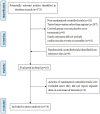Aspirin for primary prevention of cardiovascular events: meta-analysis of randomized controlled trials and subgroup analysis by sex and diabetes status
- PMID: 25360605
- PMCID: PMC4215843
- DOI: 10.1371/journal.pone.0090286
Aspirin for primary prevention of cardiovascular events: meta-analysis of randomized controlled trials and subgroup analysis by sex and diabetes status
Abstract
Objective: To evaluate the benefits and harms of aspirin for the primary prevention of CVD and determine whether the effects vary by sex and diabetes status.
Methods: We searched Medline, Embase, and Cochrane databases for randomized controlled trials comparing the effects of aspirin with placebo or control in people with no pre-existing CVD. Two investigators independently extracted data and assessed the study quality. Analyses were performed using Stata version 12.
Results: Fourteen trials (107,686 participants) were eligible. Aspirin was associated with reductions in major cardiovascular events (risk ratio, 0.90; 95% confidence interval, 0.85-0.95), myocardial infarction (0.86; 0.75-0.93), ischemic stroke (0.86; 0.75-0.98) and all-cause mortality (0.94; 0.89-0.99). There were also increases in hemorrhagic stroke (1.34; 1.01-1.79) and major bleeding (1.55; 1.35-1.78) with aspirin. The number needed to treat to prevent 1 major cardiovascular event over a mean follow-up of 6.8 years was 284. By comparison, the numbers needed to harm to cause 1 major bleeding is 299. In subgroup analyses, pooled results demonstrated a reduction in myocardial infarction among men (0.71; 0.59-0.85) and ischemic stroke among women (0.77; 0.63-0.93). Aspirin use was associated with a reduction (0.65; 0.51-0.82) in myocardial infarction among diabetic men. In meta-regression analyses, the results suggested that aspirin therapy might be associated with a decrease in stroke among diabetic women and a decrease in MI among diabetic men and risk reductions achieved with low doses (75 mg/day) were as large as those obtained with higher doses (650 mg/day).
Conclusions: The use of low-dose aspirin was beneficial for primary prevention of CVD and the decision regarding an aspirin regimen should be made on an individual patient basis. The effects of aspirin therapy varied by sex and diabetes status. A clear benefit of aspirin in the primary prevention of CVD in people with diabetes needs more trials.
Conflict of interest statement
Figures



References
-
- Aspirin for the prevention of cardiovascular disease: U.S. Preventive Services Task Force recommendation statement. Ann Intern Med 150: 396–404. - PubMed
-
- Wolff T, Miller T, Ko S (2009) Aspirin for the primary prevention of cardiovascular events: an update of the evidence for the U.S. Preventive Services Task Force. Ann Intern Med 150: 405–410. - PubMed
-
- De Berardis G, Lucisano G, D'Ettorre A, Pellegrini F, Lepore V, et al. (2012) Association of aspirin use with major bleeding in patients with and without diabetes. JAMA 307: 2286–2294. - PubMed
-
- Kappagoda T, Amsterdam E (2012) Aspirin for primary prevention of myocardial infarction: what is the evidence? J Cardiopulm Rehabil Prev 32: 1–8. - PubMed
Publication types
MeSH terms
Substances
LinkOut - more resources
Full Text Sources
Other Literature Sources
Medical

